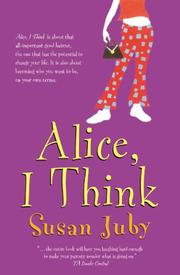Susan Juby isn’t just writing YA books anymore. Or, more
specifically, she isn’t just writing about Alice Macleod, a teenager living in
Smithers, BC, who is trying to leave her hobbit-costume legacy behind and, with
the help of her therapist, transition from homeschool into alternative school.
Juby’s new publications include her memoir, Nice
Recovery, which details her struggle with alcoholism, and The Woefield Poultry Collection, is more
adult than young adult (even though eleven-year-old Sarah Spratt is one of the
highlights of the book). And I can’t say enough about Getting the Girl, this hilarious young adult mystery novel that
Juby wrote a few years ago. But whenever I think about Susan Juby, I always go
back to Alice, I Think and the two
books that came after (Miss Smithers
and Alice Macleod, Realist at Last).
(I had a friend from Smithers, BC, who had Susan Juby come
to his school to do a reading and was really excited about it, which is
basically on the opposite side of this interview with, and I can’t remember who
exactly, but I think it was this British tennis player, where J.K. Rowling went
in to read an excerpt from Harry Potter at
his elementary school or something, and he was like, “Eh, no big deal.”)
When the book starts, Alice is reflecting on the event in
elementary school that drove her to be homeschooled for most of her life. She
“blame[s] it all on The Hobbit,”
since Alice attends school dressed in the hobbit costume that her mom made for
her and meets a girl named Linda:
“So you’re a what?” she asked.
“So you’re a what?” she asked.
“I’m a hobbit. We are small and
ordinary but also special. We can be sort of invisible sometimes. And we laugh
like this.” I have her my deepest and fruitiest laugh.
“You know what I think?” she
asked.
I shook my head.
“I think you look like an ugly
boy.”
Linda leaves Alice alone on the playground, “hobbit hat in
hand, burlap sack filled with extra cakes for new friends over my shoulder.”
After that, Alice is homeschooled, and now, where the book begins, she is in
high school, her first therapist has just suffered a meltdown, and Alice has
decided to transition back into Alternative School.
Alice is such a likeable protagonist because she has a
concept of normal, and she tries to stay as close as possible to that idea, but
she also knows who she is and that normal isn’t really what she’s looking for.
She is unique. And she overthinks
everything. Juby traces these thought patterns on their unpredictable and
waving paths, which actually start to make sense and become more rational than
what Alice holds up as “normal.” For example, she goes out for coffee with a
guy named Aubrey and she thinks,
Anyhow, I think Aubrey might be a
sociopath. I mean, he is very confident for a seventeen-year-old. He wants to
be a “low-fi musician,” which I think means that you don’t have to know how to
play your instrument that well or be a very good singer. He said he “revels in
misanthropy, but in a wholesome way.” I couldn’t help thinking about Ted Bundy.
I guess that not all sociopaths are serial killers. I read somewhere that
sociopathism can be very good in certain kinds of careers. And Aubrey isn’t
necessarily a sociopath – I just sort of wonder why he would want to have
coffee with me.
The entire time she’s on the date, and even afterwards,
she’s trying to figure out just what, exactly, she’s doing. She thinks, “For a
while I thought I was going to throw up. Was this a date? Was I dating? Have I
headed out into the sexual marketplace? I have nothing to sell…I think I love
Aubrey. I know I love my hair. I may even be a girl. The rituals of humans are
very odd.”
The three books about Alice MacLeod fit into the “humor for
young adults” category, and a lot of them are usually by British authors (all
of the Molesworth books, and St. Trinian’s, and Adrian Mole, the ones that are
around 1950s category of humor for adolescents, and then Louise Rennison and
Helen Fielding’s Bridget Jones’s Diary).
And having this category sort of sink into Canada is so great, because sure,
it’s always easy to read characters into other, more familiar places, but it’s
kind of awesome whenever there’s a book set in Smithers, BC, so you can go, “Oh
yeah, I know that town.” A few years ago The Comedy Network turned Alice, I Think into a TV show and it still runs in Canada sometimes.
And if anything, the ending of the book, Alice,
I Think, is reason enough for reading this series.*
* And Getting the Girl.
Protagonist Sherman Mack is just as nuanced as Alice MacLeod, and just as
funny.





No comments:
Post a Comment